Assessing the Economic Globalization's Impact on the Nation State
VerifiedAdded on 2022/08/13
|6
|1365
|18
Essay
AI Summary
This essay critically discusses the statement that economic globalization has reduced the role of the nation state. It begins by defining globalization and its key characteristics, including liberalization, westernization, and internationalization. The essay examines the complex interplay between nation states and globalization, highlighting how the diminishing power of nation states can be attributed to factors like the rise of multinational corporations, foreign direct investment, and the increasing interdependence among countries. The essay also delves into the challenges and opportunities globalization presents, such as the influence of westernization, the impact on developing countries, and the potential for inequalities in income and living standards. While acknowledging the negative aspects, the essay also explores arguments that globalization offers a new role for the nation state, particularly in managing international financial markets. The essay concludes by emphasizing the merits and demerits of globalization and its impact on the nation state's role in a globalized world, citing examples and academic references to support its arguments.
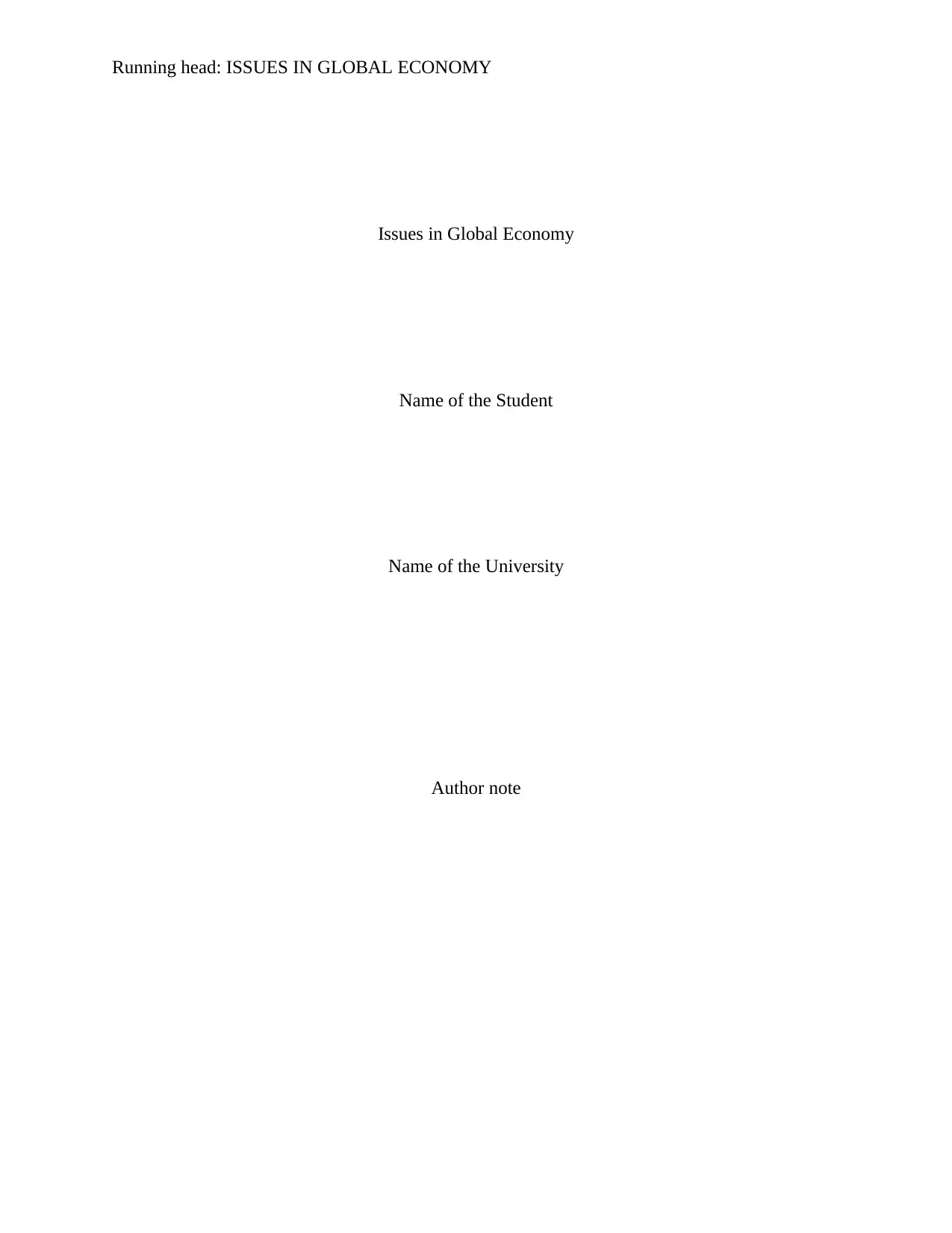
Running head: ISSUES IN GLOBAL ECONOMY
Issues in Global Economy
Name of the Student
Name of the University
Author note
Issues in Global Economy
Name of the Student
Name of the University
Author note
Paraphrase This Document
Need a fresh take? Get an instant paraphrase of this document with our AI Paraphraser
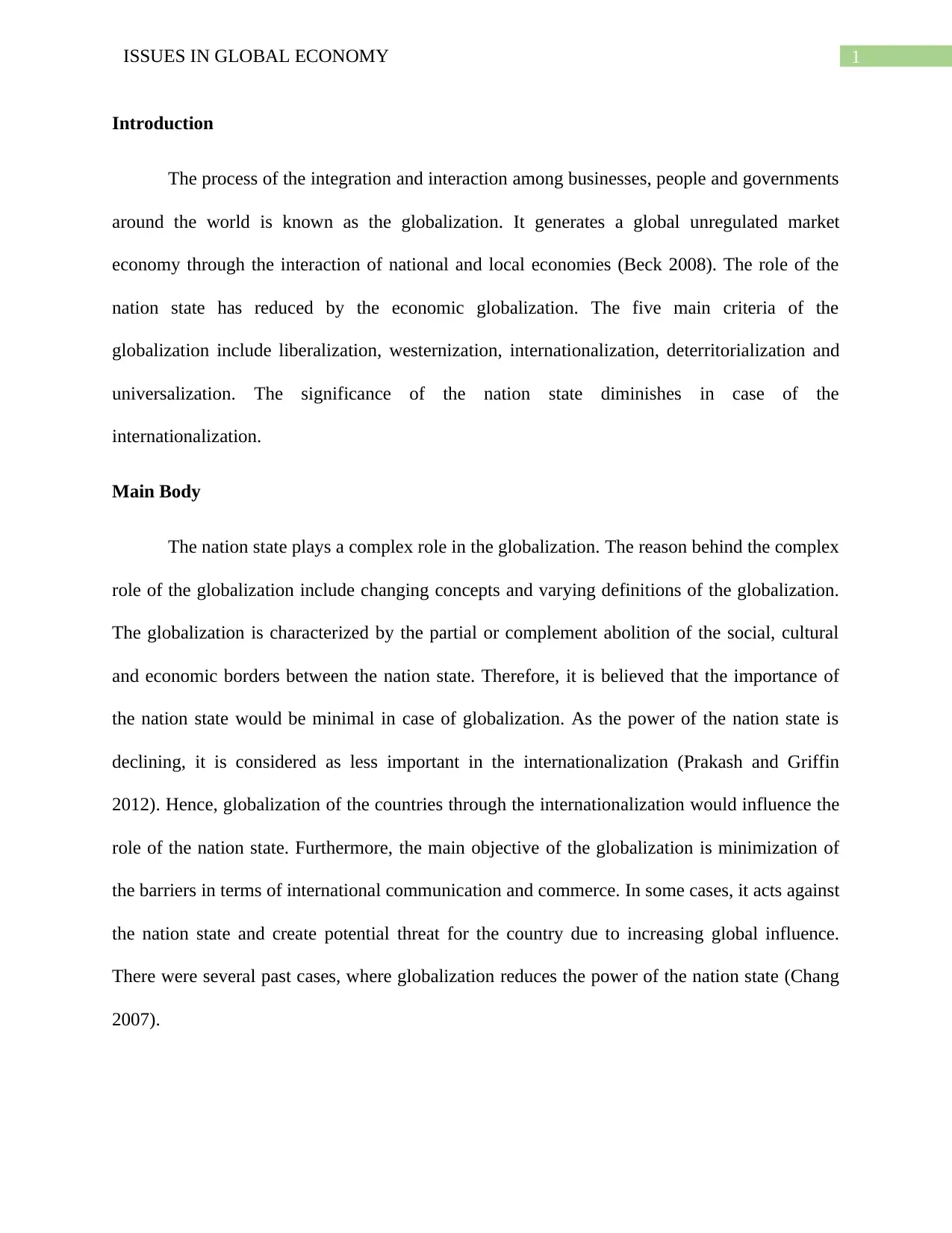
1ISSUES IN GLOBAL ECONOMY
Introduction
The process of the integration and interaction among businesses, people and governments
around the world is known as the globalization. It generates a global unregulated market
economy through the interaction of national and local economies (Beck 2008). The role of the
nation state has reduced by the economic globalization. The five main criteria of the
globalization include liberalization, westernization, internationalization, deterritorialization and
universalization. The significance of the nation state diminishes in case of the
internationalization.
Main Body
The nation state plays a complex role in the globalization. The reason behind the complex
role of the globalization include changing concepts and varying definitions of the globalization.
The globalization is characterized by the partial or complement abolition of the social, cultural
and economic borders between the nation state. Therefore, it is believed that the importance of
the nation state would be minimal in case of globalization. As the power of the nation state is
declining, it is considered as less important in the internationalization (Prakash and Griffin
2012). Hence, globalization of the countries through the internationalization would influence the
role of the nation state. Furthermore, the main objective of the globalization is minimization of
the barriers in terms of international communication and commerce. In some cases, it acts against
the nation state and create potential threat for the country due to increasing global influence.
There were several past cases, where globalization reduces the power of the nation state (Chang
2007).
Introduction
The process of the integration and interaction among businesses, people and governments
around the world is known as the globalization. It generates a global unregulated market
economy through the interaction of national and local economies (Beck 2008). The role of the
nation state has reduced by the economic globalization. The five main criteria of the
globalization include liberalization, westernization, internationalization, deterritorialization and
universalization. The significance of the nation state diminishes in case of the
internationalization.
Main Body
The nation state plays a complex role in the globalization. The reason behind the complex
role of the globalization include changing concepts and varying definitions of the globalization.
The globalization is characterized by the partial or complement abolition of the social, cultural
and economic borders between the nation state. Therefore, it is believed that the importance of
the nation state would be minimal in case of globalization. As the power of the nation state is
declining, it is considered as less important in the internationalization (Prakash and Griffin
2012). Hence, globalization of the countries through the internationalization would influence the
role of the nation state. Furthermore, the main objective of the globalization is minimization of
the barriers in terms of international communication and commerce. In some cases, it acts against
the nation state and create potential threat for the country due to increasing global influence.
There were several past cases, where globalization reduces the power of the nation state (Chang
2007).
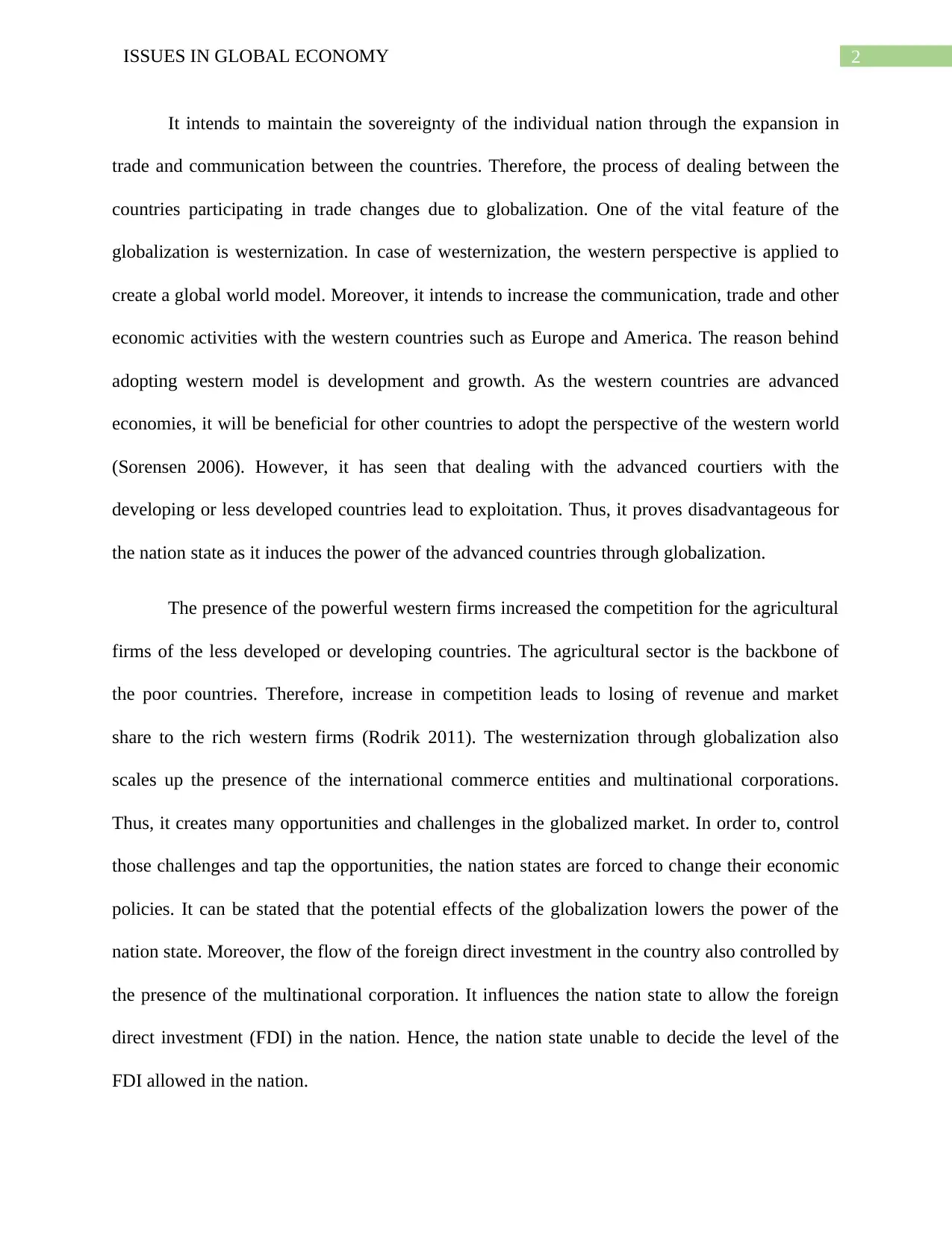
2ISSUES IN GLOBAL ECONOMY
It intends to maintain the sovereignty of the individual nation through the expansion in
trade and communication between the countries. Therefore, the process of dealing between the
countries participating in trade changes due to globalization. One of the vital feature of the
globalization is westernization. In case of westernization, the western perspective is applied to
create a global world model. Moreover, it intends to increase the communication, trade and other
economic activities with the western countries such as Europe and America. The reason behind
adopting western model is development and growth. As the western countries are advanced
economies, it will be beneficial for other countries to adopt the perspective of the western world
(Sorensen 2006). However, it has seen that dealing with the advanced courtiers with the
developing or less developed countries lead to exploitation. Thus, it proves disadvantageous for
the nation state as it induces the power of the advanced countries through globalization.
The presence of the powerful western firms increased the competition for the agricultural
firms of the less developed or developing countries. The agricultural sector is the backbone of
the poor countries. Therefore, increase in competition leads to losing of revenue and market
share to the rich western firms (Rodrik 2011). The westernization through globalization also
scales up the presence of the international commerce entities and multinational corporations.
Thus, it creates many opportunities and challenges in the globalized market. In order to, control
those challenges and tap the opportunities, the nation states are forced to change their economic
policies. It can be stated that the potential effects of the globalization lowers the power of the
nation state. Moreover, the flow of the foreign direct investment in the country also controlled by
the presence of the multinational corporation. It influences the nation state to allow the foreign
direct investment (FDI) in the nation. Hence, the nation state unable to decide the level of the
FDI allowed in the nation.
It intends to maintain the sovereignty of the individual nation through the expansion in
trade and communication between the countries. Therefore, the process of dealing between the
countries participating in trade changes due to globalization. One of the vital feature of the
globalization is westernization. In case of westernization, the western perspective is applied to
create a global world model. Moreover, it intends to increase the communication, trade and other
economic activities with the western countries such as Europe and America. The reason behind
adopting western model is development and growth. As the western countries are advanced
economies, it will be beneficial for other countries to adopt the perspective of the western world
(Sorensen 2006). However, it has seen that dealing with the advanced courtiers with the
developing or less developed countries lead to exploitation. Thus, it proves disadvantageous for
the nation state as it induces the power of the advanced countries through globalization.
The presence of the powerful western firms increased the competition for the agricultural
firms of the less developed or developing countries. The agricultural sector is the backbone of
the poor countries. Therefore, increase in competition leads to losing of revenue and market
share to the rich western firms (Rodrik 2011). The westernization through globalization also
scales up the presence of the international commerce entities and multinational corporations.
Thus, it creates many opportunities and challenges in the globalized market. In order to, control
those challenges and tap the opportunities, the nation states are forced to change their economic
policies. It can be stated that the potential effects of the globalization lowers the power of the
nation state. Moreover, the flow of the foreign direct investment in the country also controlled by
the presence of the multinational corporation. It influences the nation state to allow the foreign
direct investment (FDI) in the nation. Hence, the nation state unable to decide the level of the
FDI allowed in the nation.
⊘ This is a preview!⊘
Do you want full access?
Subscribe today to unlock all pages.

Trusted by 1+ million students worldwide
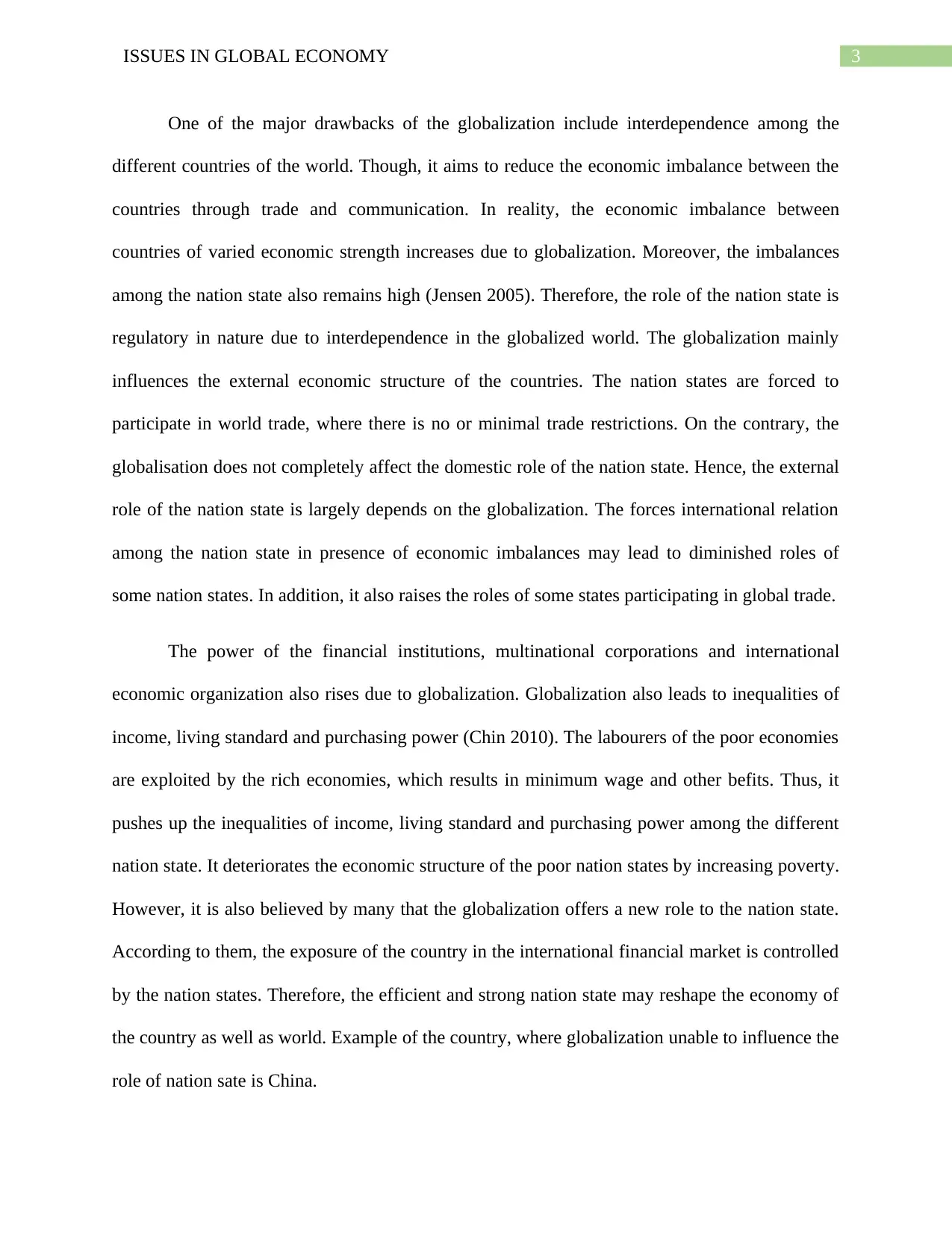
3ISSUES IN GLOBAL ECONOMY
One of the major drawbacks of the globalization include interdependence among the
different countries of the world. Though, it aims to reduce the economic imbalance between the
countries through trade and communication. In reality, the economic imbalance between
countries of varied economic strength increases due to globalization. Moreover, the imbalances
among the nation state also remains high (Jensen 2005). Therefore, the role of the nation state is
regulatory in nature due to interdependence in the globalized world. The globalization mainly
influences the external economic structure of the countries. The nation states are forced to
participate in world trade, where there is no or minimal trade restrictions. On the contrary, the
globalisation does not completely affect the domestic role of the nation state. Hence, the external
role of the nation state is largely depends on the globalization. The forces international relation
among the nation state in presence of economic imbalances may lead to diminished roles of
some nation states. In addition, it also raises the roles of some states participating in global trade.
The power of the financial institutions, multinational corporations and international
economic organization also rises due to globalization. Globalization also leads to inequalities of
income, living standard and purchasing power (Chin 2010). The labourers of the poor economies
are exploited by the rich economies, which results in minimum wage and other befits. Thus, it
pushes up the inequalities of income, living standard and purchasing power among the different
nation state. It deteriorates the economic structure of the poor nation states by increasing poverty.
However, it is also believed by many that the globalization offers a new role to the nation state.
According to them, the exposure of the country in the international financial market is controlled
by the nation states. Therefore, the efficient and strong nation state may reshape the economy of
the country as well as world. Example of the country, where globalization unable to influence the
role of nation sate is China.
One of the major drawbacks of the globalization include interdependence among the
different countries of the world. Though, it aims to reduce the economic imbalance between the
countries through trade and communication. In reality, the economic imbalance between
countries of varied economic strength increases due to globalization. Moreover, the imbalances
among the nation state also remains high (Jensen 2005). Therefore, the role of the nation state is
regulatory in nature due to interdependence in the globalized world. The globalization mainly
influences the external economic structure of the countries. The nation states are forced to
participate in world trade, where there is no or minimal trade restrictions. On the contrary, the
globalisation does not completely affect the domestic role of the nation state. Hence, the external
role of the nation state is largely depends on the globalization. The forces international relation
among the nation state in presence of economic imbalances may lead to diminished roles of
some nation states. In addition, it also raises the roles of some states participating in global trade.
The power of the financial institutions, multinational corporations and international
economic organization also rises due to globalization. Globalization also leads to inequalities of
income, living standard and purchasing power (Chin 2010). The labourers of the poor economies
are exploited by the rich economies, which results in minimum wage and other befits. Thus, it
pushes up the inequalities of income, living standard and purchasing power among the different
nation state. It deteriorates the economic structure of the poor nation states by increasing poverty.
However, it is also believed by many that the globalization offers a new role to the nation state.
According to them, the exposure of the country in the international financial market is controlled
by the nation states. Therefore, the efficient and strong nation state may reshape the economy of
the country as well as world. Example of the country, where globalization unable to influence the
role of nation sate is China.
Paraphrase This Document
Need a fresh take? Get an instant paraphrase of this document with our AI Paraphraser
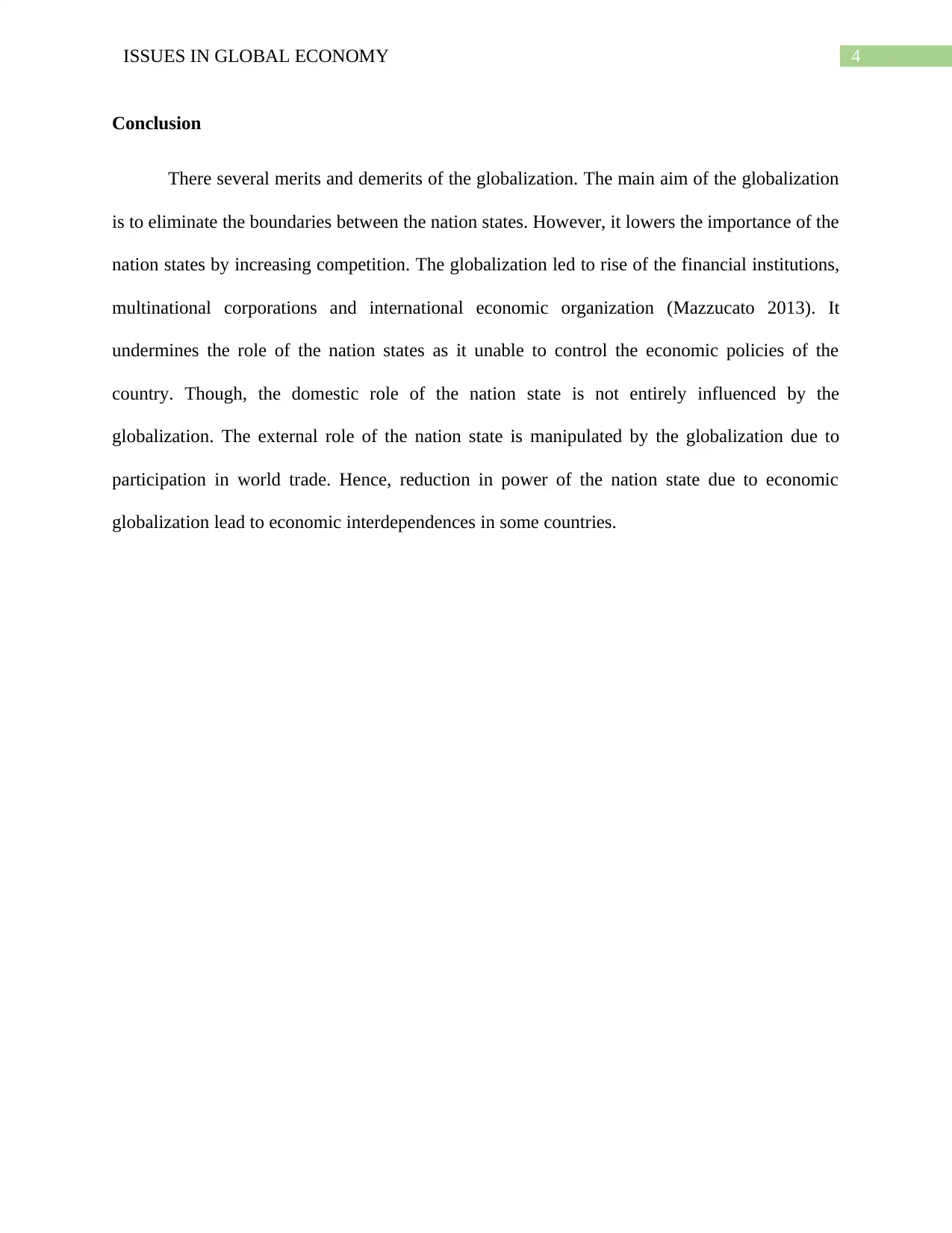
4ISSUES IN GLOBAL ECONOMY
Conclusion
There several merits and demerits of the globalization. The main aim of the globalization
is to eliminate the boundaries between the nation states. However, it lowers the importance of the
nation states by increasing competition. The globalization led to rise of the financial institutions,
multinational corporations and international economic organization (Mazzucato 2013). It
undermines the role of the nation states as it unable to control the economic policies of the
country. Though, the domestic role of the nation state is not entirely influenced by the
globalization. The external role of the nation state is manipulated by the globalization due to
participation in world trade. Hence, reduction in power of the nation state due to economic
globalization lead to economic interdependences in some countries.
Conclusion
There several merits and demerits of the globalization. The main aim of the globalization
is to eliminate the boundaries between the nation states. However, it lowers the importance of the
nation states by increasing competition. The globalization led to rise of the financial institutions,
multinational corporations and international economic organization (Mazzucato 2013). It
undermines the role of the nation states as it unable to control the economic policies of the
country. Though, the domestic role of the nation state is not entirely influenced by the
globalization. The external role of the nation state is manipulated by the globalization due to
participation in world trade. Hence, reduction in power of the nation state due to economic
globalization lead to economic interdependences in some countries.
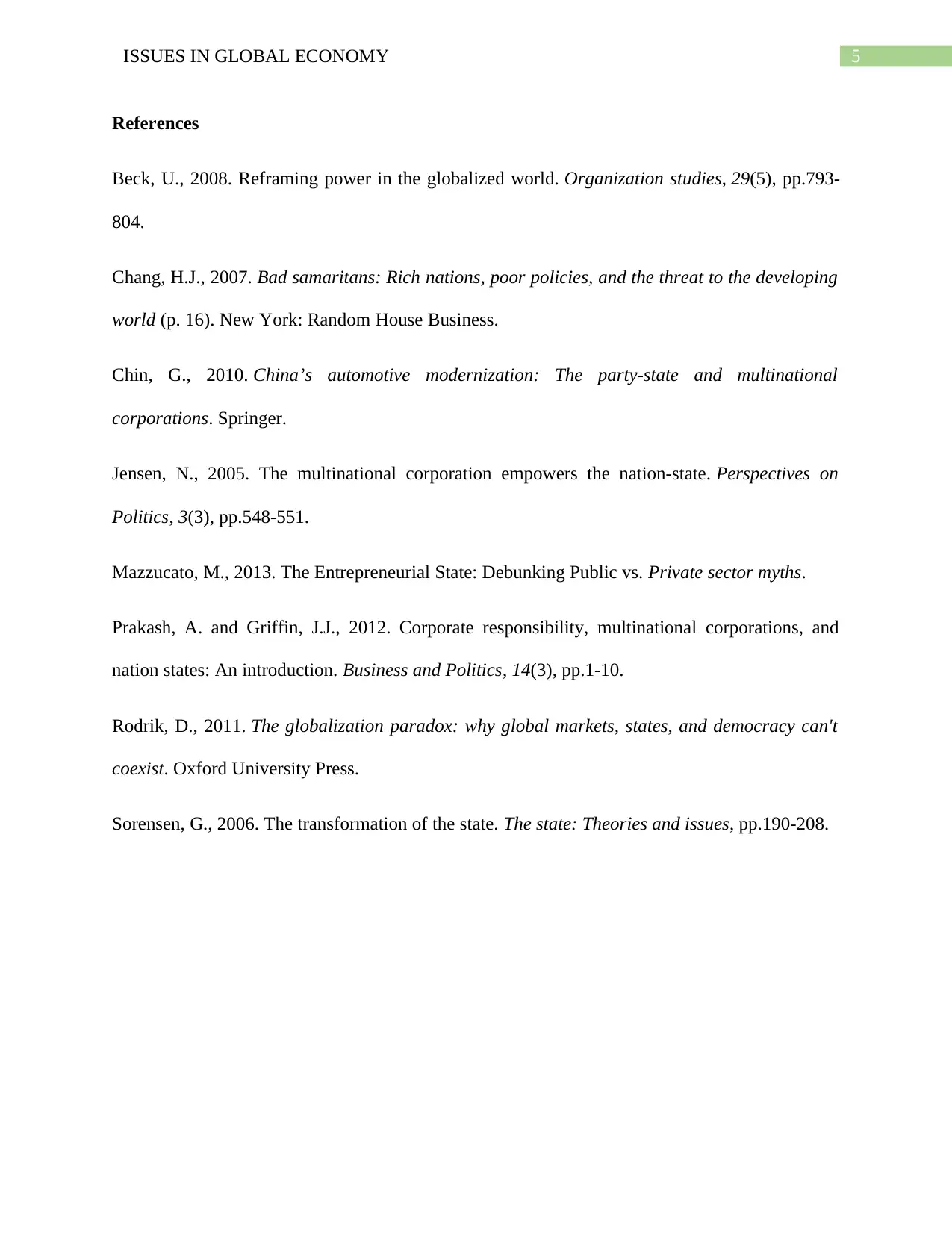
5ISSUES IN GLOBAL ECONOMY
References
Beck, U., 2008. Reframing power in the globalized world. Organization studies, 29(5), pp.793-
804.
Chang, H.J., 2007. Bad samaritans: Rich nations, poor policies, and the threat to the developing
world (p. 16). New York: Random House Business.
Chin, G., 2010. China’s automotive modernization: The party-state and multinational
corporations. Springer.
Jensen, N., 2005. The multinational corporation empowers the nation-state. Perspectives on
Politics, 3(3), pp.548-551.
Mazzucato, M., 2013. The Entrepreneurial State: Debunking Public vs. Private sector myths.
Prakash, A. and Griffin, J.J., 2012. Corporate responsibility, multinational corporations, and
nation states: An introduction. Business and Politics, 14(3), pp.1-10.
Rodrik, D., 2011. The globalization paradox: why global markets, states, and democracy can't
coexist. Oxford University Press.
Sorensen, G., 2006. The transformation of the state. The state: Theories and issues, pp.190-208.
References
Beck, U., 2008. Reframing power in the globalized world. Organization studies, 29(5), pp.793-
804.
Chang, H.J., 2007. Bad samaritans: Rich nations, poor policies, and the threat to the developing
world (p. 16). New York: Random House Business.
Chin, G., 2010. China’s automotive modernization: The party-state and multinational
corporations. Springer.
Jensen, N., 2005. The multinational corporation empowers the nation-state. Perspectives on
Politics, 3(3), pp.548-551.
Mazzucato, M., 2013. The Entrepreneurial State: Debunking Public vs. Private sector myths.
Prakash, A. and Griffin, J.J., 2012. Corporate responsibility, multinational corporations, and
nation states: An introduction. Business and Politics, 14(3), pp.1-10.
Rodrik, D., 2011. The globalization paradox: why global markets, states, and democracy can't
coexist. Oxford University Press.
Sorensen, G., 2006. The transformation of the state. The state: Theories and issues, pp.190-208.
⊘ This is a preview!⊘
Do you want full access?
Subscribe today to unlock all pages.

Trusted by 1+ million students worldwide
1 out of 6
Related Documents
Your All-in-One AI-Powered Toolkit for Academic Success.
+13062052269
info@desklib.com
Available 24*7 on WhatsApp / Email
![[object Object]](/_next/static/media/star-bottom.7253800d.svg)
Unlock your academic potential
Copyright © 2020–2025 A2Z Services. All Rights Reserved. Developed and managed by ZUCOL.




